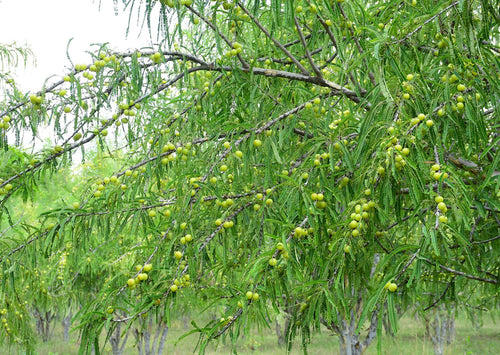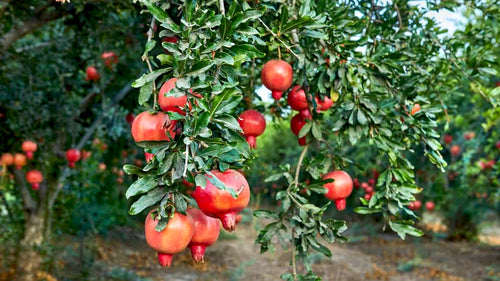Max Life Insurance's Urban Forest Initiative: A Breath of Fresh Air for Delhi
Max Life Insurance, one of India’s leading life insurance companies, has taken a significant step toward environmental sustainability through its tree Read more
Project Update 2
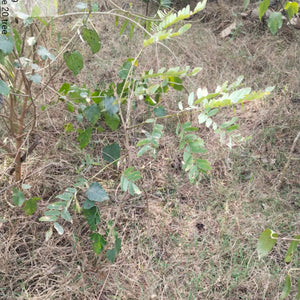
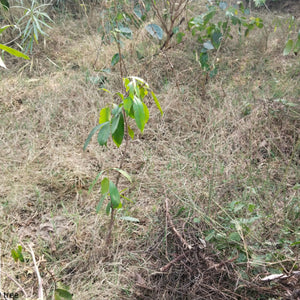
Project Update 1
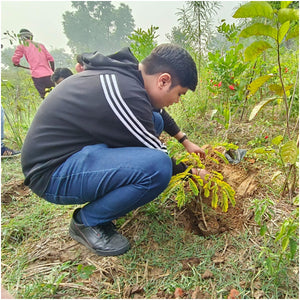
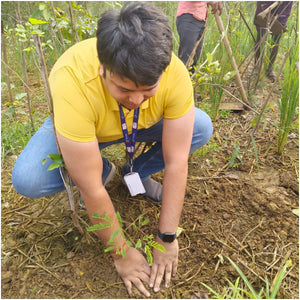
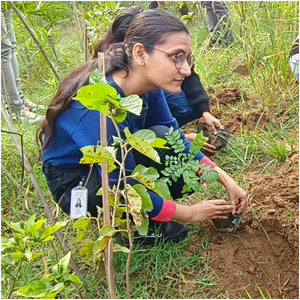
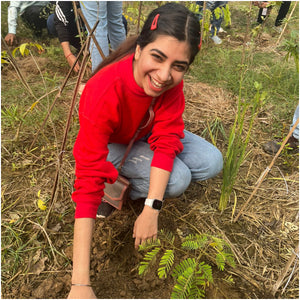
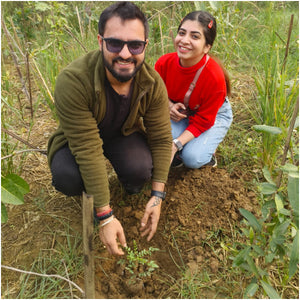
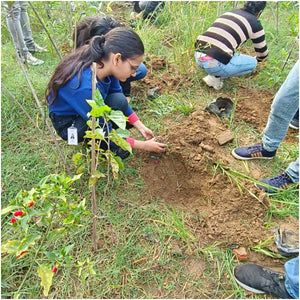
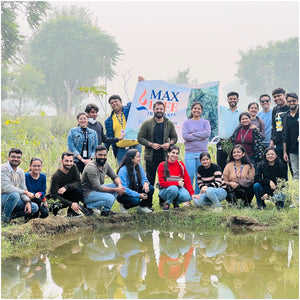


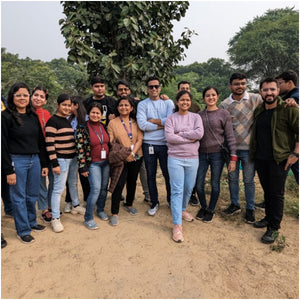
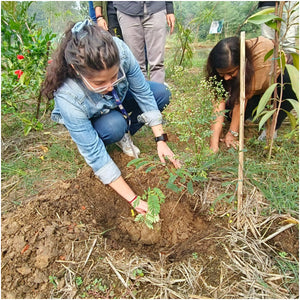

Digital Forest
Forest with 20 Trees planned
Want to plant your tree now?
Plant a Tree @ 299Max Life Insurance's Urban Forest Initiative: A Breath of Fresh Air for Delhi
Max Life Insurance, one of India’s leading life insurance companies, has taken a significant step toward environmental sustainability through its tree plantation initiative in the urban forest concept. As part of its commitment to fostering greener communities, Max Life Insurance actively involves employees in tree planting activities, transforming urban spaces into lush green zones.
This initiative not only contributes to environmental rejuvenation but also strengthens employee engagement by creating opportunities for hands-on participation in sustainability efforts. Employees come together to plant and nurture trees, fostering a sense of unity and purpose while positively impacting the environment.
By integrating urban forestation into its CSR framework, Max Life Insurance exemplifies its dedication to holistic well-being ensuring a healthier planet for future generations while reinforcing its core values of responsibility and care. Through this initiative, Max Life Insurance continues to build a greener, more sustainable urban landscape.
Tree Plantation Date
30th November 2023
Plantation Location
Miyawaki Urban Forest, Kanganheri, Delhi 110071
Trees Planted
Total Count: 20 Trees
Species Name: Dudhi, Pomegranate, Tamarind, Amla, Kaner, Badam
Forest Type: Urban Forest
Max Life Insurance has launched an urban forest tree plantation initiative as part of its employee engagement and sustainability efforts. This initiative encourages employees to actively participate in creating green spaces within urban areas, fostering a sense of environmental responsibility and teamwork. By planting and nurturing trees, employees contribute to transforming city landscapes into thriving ecosystems, helping to combat pollution and enhance biodiversity. This initiative reflects Max Life Insurance’s commitment to building a sustainable future while promoting employee well-being and engagement through meaningful environmental action.
Advantages Of Urban Forest
Enhanced Employee Well-Being and Mental Health
Participating in tree plantation activities allows employees to step away from their desks and engage with nature, promoting mental relaxation and reducing stress. The act of planting trees fosters mindfulness and provides a break from daily routines, contributing to overall well-being.Stronger Team Bonding and Collaboration
Tree plantation events create opportunities for employees to work together outside of the office, fostering camaraderie and teamwork. This shared experience strengthens relationships across departments, enhancing communication and collaboration in the workplace.Sense of Purpose and Contribution
By contributing to the development of urban forests, employees experience a sense of fulfillment and purpose. Knowing their efforts directly impact the environment instills pride and reinforces the company’s values of sustainability and social responsibility.Increased Environmental Awareness
Engaging employees in tree plantation initiatives raises awareness about environmental issues and the importance of green spaces. This knowledge often extends beyond the workplace, encouraging employees to adopt eco-friendly habits in their personal lives.Positive Brand Image and Corporate Reputation
Max Life Insurance’s commitment to urban forestry showcases the company’s dedication to sustainability and employee welfare. This enhances the company’s public image, attracting eco-conscious clients, partners, and potential employees.Long-Term Impact and Legacy
The trees planted as part of the initiative will continue to grow and benefit the community for years to come. Employees feel a sense of pride in leaving a lasting, positive legacy that contributes to a greener and healthier urban environment.Alignment with Corporate Social Responsibility (CSR) Goals
This initiative aligns with Max Life Insurance’s broader CSR objectives, promoting sustainable development while engaging employees in meaningful activities that reflect the company’s mission to create positive societal change.
Activities During Tree Plantation
During Max Life Insurance’s tree plantation initiative, employees actively participated in planting saplings and watering them, contributing to the creation of urban green spaces. The site was meticulously prepared in advance, ensuring smooth execution on the day of the activity. Employees gathered to plant a variety of native tree species, fostering teamwork and environmental stewardship. After planting, they watered the saplings, symbolizing their collective responsibility in nurturing the growth of the urban forest. This hands-on engagement not only strengthened employee bonds but also instilled a shared sense of purpose and pride in contributing to a greener, more sustainable future.
Tree Plantation Purpose
SDGs Achieved Through Max Life Insurance’s Tree Plantation Initiative in Urban Forest Concept
1. SDG 3: Good Health and Well-Being
Urban forests improve air quality, reduce pollution, and provide a healthier environment, directly benefiting employee and community well-being. By participating in tree plantation activities, employees experience reduced stress, enhanced mental health, and a stronger connection to nature, promoting overall physical and emotional wellness.2. SDG 11: Sustainable Cities and Communities
The initiative contributes to creating greener urban spaces, enhancing biodiversity, and mitigating the effects of urbanization. Urban forests help lower temperatures, reduce noise pollution, and improve the quality of life in cities. Max Life Insurance’s efforts align with building sustainable, resilient communities that are more livable and environmentally friendly.3. SDG 13: Climate Action
By planting trees, the initiative plays a role in carbon sequestration, helping to combat climate change. Trees absorb CO2, reducing the overall carbon footprint and contributing to long-term climate resilience. Employee participation reinforces the company’s commitment to environmental sustainability and climate action.4. SDG 15: Life on Land
The tree plantation initiative supports biodiversity by creating habitats for various species within urban environments. Increasing green cover restores ecosystems, prevents soil erosion, and enhances the ecological balance. This initiative reflects Max Life Insurance’s dedication to preserving and protecting terrestrial ecosystems.5. SDG 17: Partnerships for the Goals
Max Life Insurance’s partnership with Grow Billion Trees exemplifies SDG 17 Partnerships for the Goals by fostering collaboration for large-scale environmental impact. Through this alliance, Max Life Insurance has actively engaged its employees in urban forestation projects, amplifying the reach and effectiveness of its sustainability initiatives. Grow Billion Trees’ expertise in site preparation and ecological planning ensures that each plantation effort contributes meaningfully to biodiversity and carbon sequestration. This partnership not only advances environmental goals but also strengthens community engagement, showcasing how collective efforts between corporations and environmental organizations can drive significant progress toward a greener, more sustainable future.
ESGs Achieved Through Urban Forest
Environmental (E)
Max Life Insurance’s urban forest tree plantation initiative directly contributes to environmental sustainability by increasing green cover, reducing carbon emissions, and enhancing biodiversity. Planting trees in urban spaces improves air quality, mitigates the urban heat island effect, and supports climate resilience. Employees actively participate in nurturing these green spaces, fostering a culture of environmental responsibility within the organization. This initiative reflects Max Life Insurance’s commitment to reducing its ecological footprint and promoting long-term environmental stewardship.Social (S)
The initiative strengthens employee engagement by providing meaningful opportunities for collective action towards a common environmental goal. By involving employees in tree plantation and care, the initiative fosters teamwork, collaboration, and a sense of pride and purpose. It also enhances the well-being of employees by promoting outdoor activity and mental relaxation. Beyond the organization, the urban forests created through this initiative contribute to healthier, greener communities, positively impacting local residents and future generations.Governance (G)
Max Life Insurance’s tree plantation initiative aligns with its broader corporate governance and CSR strategies, reinforcing transparency, accountability, and ethical practices. By partnering with Grow Billion Trees, the company ensures that the initiative is professionally managed and yields measurable environmental benefits. This reflects Max Life Insurance’s commitment to integrating sustainability into its core operations and decision-making processes, setting an example for responsible corporate leadership in environmental and social governance.
Commitment by Grow Billion Trees
Grow Billion Trees is committed to driving sustainable plantation efforts, ensuring every initiative aligns with key environmental objectives and promotes long-term ecological balance. They focus on selecting native tree species that are well-adapted to local ecosystems, ensuring a higher survival rate and stronger environmental impact.
To maintain plant health and longevity, Grow Billion Trees emphasizes continuous maintenance and regular monitoring of the plantations. This approach helps ensure that each tree thrives, contributing effectively to both biodiversity and climate resilience.
Transparency is a core principle in their operations. Clients receive comprehensive reports, including geo-tagging of planted trees, survival rate updates, and ongoing progress reports. This level of openness allows clients to track the direct impact of their contributions, reinforcing trust and accountability.
Through their dedication to sustainable practices, Grow Billion Trees ensures that every plantation project leaves a lasting positive footprint on both the environment and the local communities it serves.
Summary
Max Life Insurance’s tree plantation initiative in the urban forest concept reflects its commitment to sustainability and employee engagement. Through this initiative, employees actively participate in planting and nurturing trees, contributing to greener urban spaces and environmental rejuvenation. The project not only enhances biodiversity and improves air quality but also fosters teamwork, well-being, and a sense of shared purpose among employees. By integrating sustainability into its corporate culture, Max Life Insurance strengthens its environmental, social, and governance (ESG) commitments, aligning with global goals for climate action and sustainable urban development.
Trees for Corporates
Trending
Most Popular
1. Max Life Insurance tree plantation initiative
Max Life Insurance is not just about securing lives but also about securing the planet! Their tree plantation initiative is like nature’s life insurance policy – plant now, breathe easy later. Employees trade their laptops for shovels, turning office breaks into forest-making marathons. By transforming barren spaces into lush urban forests, Max Life Insurance shows that sustainability and employee engagement can go hand in hand. This initiative not only reduces carbon footprints but also strengthens bonds within teams, proving that a little dirt under the nails can lead to cleaner air and greener cities.
2. Urban forest creation by Max Life Insurance
Max Life Insurance is out to prove that the concrete jungle needs more actual jungles! Through their urban forest creation drive, employees swap cubicles for green canopies. By planting trees in city spaces, Max Life breathes life into urban areas, making them healthier and happier. These green patches act as nature’s air filters while giving employees a hands-on experience in creating a better future. The urban forest isn’t just about aesthetics – it’s about reversing climate change, one tree at a time.
3. Employee engagement through tree plantation
Forget trust falls and escape rooms – Max Life Insurance believes employee bonding happens best with a shovel in hand. Their tree plantation drives engage employees by planting seeds of camaraderie and environmental consciousness. As saplings grow, so do workplace relationships, fostering teamwork and pride. This green-thumbed approach to employee engagement builds a workforce that’s not just driven but deeply rooted in sustainability.
4. Sustainable initiatives by Max Life Insurance
a business that cares for the environment thrives in every aspect.
5. Max Life Insurance CSR tree plantation
Max Life’s CSR doesn’t stop at financial wellness – they’re in the business of greening the world! Their tree plantation initiative shows that corporate responsibility isn’t just about donations; it’s about dedication. By involving employees in CSR tree plantation activities, Max Life proves that giving back to the planet is as important as giving back to the community.
6. Urban greening by Max Life Insurance
Urban greening is Max Life Insurance’s answer to smog-filled skylines. By creating micro-forests in urban spaces, Max Life turns grey into green. Employees join hands to bring patches of greenery into bustling cities, creating breathing spaces for communities. It’s corporate responsibility done right – where every planted sapling fights pollution and boosts biodiversity.
7. Max Life Insurance sustainability efforts
Sustainability is more than a buzzword at Max Life Insurance – it’s a way of doing business. Their tree plantation initiatives are a testament to their long-term vision for a greener planet. Employees actively participate, reinforcing the idea that sustainability starts at the workplace and spreads to the community. It’s a win-win for the planet and the people.
8. Eco-friendly corporate events by Max Life Insurance
Max Life Insurance turns corporate events into eco-friendly celebrations by organizing tree plantation drives. Instead of handing out swag bags, employees take home the satisfaction of planting a tree. These events are fun, impactful, and a great way to leave a lasting green mark on the planet. Who needs a plaque when you can grow a tree?
FAQ
What is Max Life Insurance’s tree plantation initiative about?
Max Life Insurance’s tree plantation initiative focuses on creating urban forests and increasing green cover in cities. This initiative engages employees in planting and nurturing saplings, contributing to environmental sustainability and combating climate change. By transforming urban spaces, Max Life Insurance aims to reduce pollution, improve biodiversity, and promote healthier communities.
How does tree plantation benefit Max Life Insurance employees?
Tree plantation fosters employee engagement by encouraging teamwork and environmental stewardship. Employees participate actively in planting and caring for trees, enhancing mental well-being and strengthening bonds within teams. This initiative promotes a sense of pride and connection to sustainability efforts.
Why does Max Life Insurance focus on urban forests?
Urban forests play a crucial role in improving air quality, reducing heat, and supporting biodiversity. Max Life Insurance prioritizes urban forest creation to make cities greener and more livable. This aligns with the company’s sustainability goals, enhancing community well-being and environmental resilience.
How does the initiative contribute to Max Life Insurance’s CSR goals?
Max Life Insurance integrates tree plantation into its CSR strategy to promote environmental responsibility. By involving employees and communities in urban forest projects, the company drives long-term positive impact, reinforcing its dedication to sustainability and community development.
Where are the tree plantation activities conducted?
Max Life Insurance conducts tree plantation drives in urban areas where green cover is needed the most. These activities transform underutilized or barren spaces into thriving urban forests, benefiting both the environment and local communities.
How does Max Life Insurance ensure the success of the planted trees?
Max Life Insurance partners with Grow Billion Trees to ensure professional site preparation, sapling selection, and post-plantation care. This ensures the trees thrive and contribute to long-term environmental benefits. Regular monitoring and maintenance safeguard the growth of each tree.
What environmental benefits do Max Life Insurance’s urban forests provide?
The urban forests created by Max Life Insurance improve air quality, reduce carbon dioxide, lower urban temperatures, and provide habitats for wildlife. They also prevent soil erosion and enhance the overall ecological balance in urban environments.
How can employees participate in the tree plantation initiative?
Employees can join scheduled plantation drives organized by Max Life Insurance. They engage in planting saplings and watering them, contributing directly to the growth of urban forests. Participation is voluntary but widely encouraged as part of employee engagement programs.
How does Max Life Insurance align the initiative with global sustainability goals?
Max Life Insurance’s tree plantation initiative supports the United Nations Sustainable Development Goals (SDGs), particularly SDG 13 (Climate Action), SDG 11 (Sustainable Cities), and SDG 15 (Life on Land). By fostering urban forests, the company addresses climate change, biodiversity, and sustainable urban development.
What future plans does Max Life Insurance have for tree plantation initiatives?
Max Life Insurance plans to expand tree plantation drives, increasing the scale and frequency of urban forest projects. The company aims to involve more employees, collaborate with local communities, and enhance urban biodiversity, reinforcing its long-term commitment to environmental sustainability.
- Choosing a selection results in a full page refresh.
- Opens in a new window.


